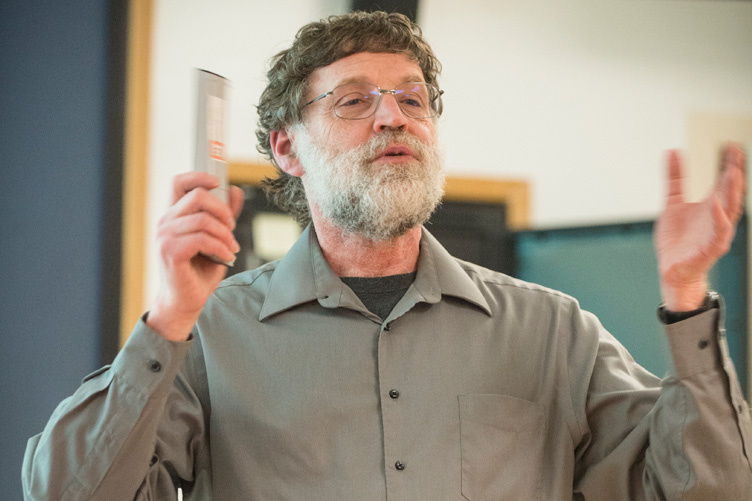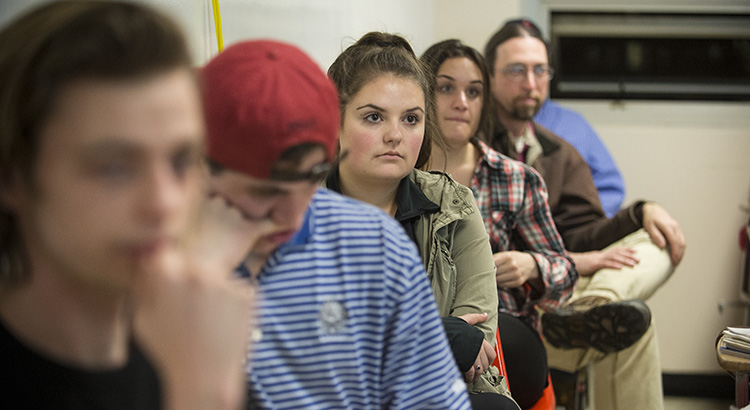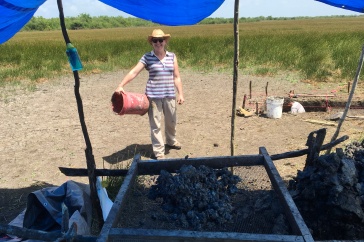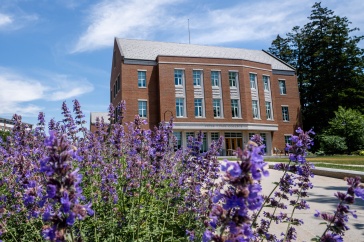
Professor Joshua Meyrowitz in the classroom.
"We need to see how the sausage is made,” says Joshua Meyrowitz, professor of communication.
News organizations, he explains, "don’t often uncover the processes through which they cover the news,” so few are going to tell us the who, what, when, where, why and how behind the who, what, when, where, why and how of reporting. We have to investigate that for ourselves if we want to fully understand how the news works.
Meyrowitz has been skillfully conducting that investigation with students for decades, garnering UNH Teaching Excellence and Lindberg awards along the way. Author of the groundbreaking book “No Sense of Place: The Impact of Electronic Media on Social Behavior,” Meyrowitz is retiring in May after 38 years at UNH. He’s holding his last Analysis of News course this semester, his final chance to train students in the skill of not believing everything they see in the news — or, at least, understanding the many factors that shape what they see.
On one particular evening this semester, students and guests claim their seats in a line around three sides of the classroom. A topic-setting preview video is already playing — a documentary about Hurricane Katrina. On a desk at the front of the room is a copy of Time magazine with Donald Trump pictured and the cover line, “Person of the Year.” Handouts, transparencies and DVDs are in stacks, ready to go.
Tonight’s class will cover the “what” of news: What stories do the media most typically choose to tell? What angles do those stories take? What are the cultural values that shape the storytelling?
The video clips and handouts are meant to demonstrate possible answers to these questions. The Katrina documentary discusses the widespread criticism of New Orleans residents for failing to evacuate ahead of the storm. The reality is that many didn’t have cars, money or places to go. The coverage reflects our culture’s belief in rugged individualism, suggests Meyrowitz, which cannot easily integrate collective poverty. The Time magazine cover? Another manifestation of the cultural currency placed on individual versus group achievement. Using case studies and examples ranging from the 1980s to today, the class plumbs common American convictions, such as the belief in the inviolability of capitalism and the superiority of American ingenuity. These assumptions can and often do shape what the media choose not to cover: Helen Keller’s socialist beliefs or reports of Cuba’s model policies in hurricane management, as examples.
He’s quick to point out that the news media rarely consciously peddle these values, nor are they imposed by outside forces. It’s simply the environment in which we are brought up, he says. It’s important to be aware of the cultural biases in which we and our institutions operate.


Meyrowitz knows that such discussions might agitate some students. It’s part of his plan. He says to his class, “I want to unsettle you to break you out of your typical frames of reference.”
The course has expanded the worldview of many students. Emily Masse ’18 was surprised when she learned of the unspoken relationship between journalists and officials that influences the content of much news.
“I noticed that riots and marches are portrayed in the news as negative, that protesters are portrayed as ignorant and anti-government,” says Masse, “but journalists report them like that to maintain their good relationships with officials and police because officials and police are the journalists’ sources for news. That relationship makes perfect sense, and our studies in this course have opened my eyes to the way the news culture works.”
Shannon Amrein ’17 says that the most frightening thing she’s learned so far is “how easy it is for people in positions of authority — like politicians, the president, the police, etc. — to lie and get away with it.”
The students frequently watch documentaries that complicate mainstream media versions of events such as the U.S. invasion of Grenada or the FBI’s assassination of Black Panther leader Fred Hampton.
Over the course of the semester, students will explore many factors that shape the for-profit news landscape. News organizations may be under pressure from sources whom they rely on. Corporate owners may push their own agenda or news that sells. Advertisers may pull their support if stories reflect badly on their brand. There are legal concerns and financial concerns. And what is the proper role of journalism anyway? Is it to objectively report competing claims or determine which claims are truthful and accurate?
To complicate matters, the U.S. is experiencing a moment when the White House is curtailing media rights and when trust in the press largely runs along party lines, according to recent polls such as the Quinnipiac University poll and the Fox News Poll. So how are Americans to interpret the news they encounter?
Meyrowitz suggests moving beyond the mainstream media and consulting a variety of alternative news sources to get multiple perspectives.
“’Alternative’ doesn’t necessarily mean ‘true,’ but it does mean different," he says. "And past experience suggests that the alternative media have been far ahead of the mainstream, corporate media in identifying omissions and distortions in ‘official reports.’”
In order to build a diversity of perspectives for the long term, one that can better withstand market and political pressures, we may need to look to public funding, suggests Meyrowitz. He supports arguments such as those made by Robert McChesney and John Nichols in their 2010 book “The Death and Life of American Journalism: The Media Revolution that Will Begin the World Again.” They call for significant public subsidies of the U.S. media in order to develop a robust and diverse Fourth Estate that fulfills its important constitutional role. It’s a model successfully undertaken in other countries, they say.
As long as we have a for-profit media, we must be vigilant consumers of news. That's a practice to which Meyrowitz has dedicated his career, and, thanks to him, generations of alumni now practice it, too.
-
Written By:
Susan Dumais '88 '02G | College of Liberal Arts
















































